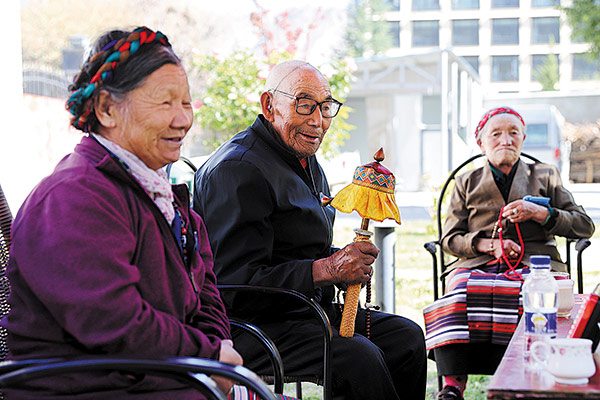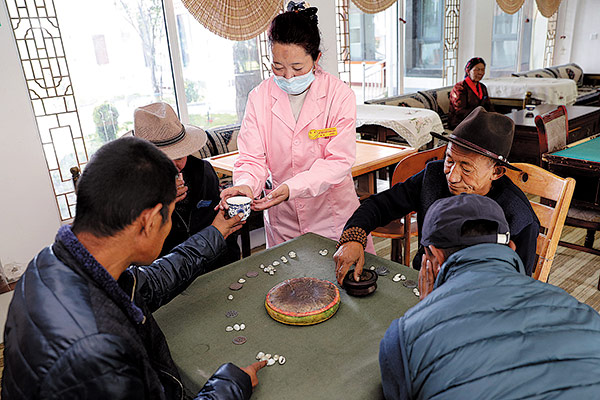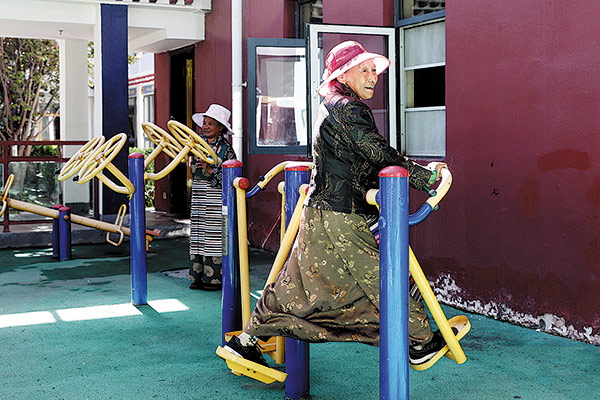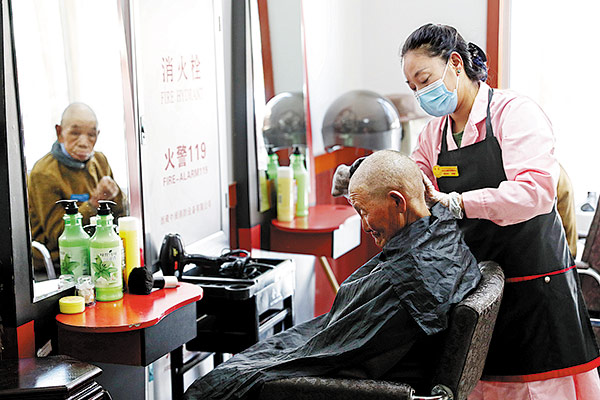Answering a call to care
Updated: 2021-08-02 By Xu Lin (China Daily)  Print
Print 



Jampa Ngodrup (middle), 86, joins residents for a traditional butter tea in the Chengguan welfare institution in Lhasa, Tibet autonomous region. [Photo by WANG ZHUANGFEI/CHINA DAILY]
Holding an exquisite prayer wheel in his hand, Jampa Ngodrup, 86, joins other Tibetans in drinking traditional butter tea in a yard, basking in the sunshine. Inside a hall, four elderly men play a dice game.
It's a regular day in the life of Jampa Ngodrup and his wife, who have lived in a welfare institution run by the civil affairs bureau of Chengguan district, Lhasa, capital of Southwest China's Tibet autonomous region, for a decade. His daily routine includes offering fresh water to a Buddha statue in his room after breakfast and walking to the nearby White Pagoda for prayers.
"I used to be a farmer and had to work very hard. Now, I'm living a happy life here, being taken good care of, without any need to worry about food and clothing. I'd like to maintain the current status," says Jampa Ngodrup, who is childless.
He's in good health except for a minor eye problem.
Dorje, 50, another Tibetan resident there, who has no family, agrees. "My life is carefree. I spend my spare time worshipping at the pagoda or chatting with others and watching TV."
She can't do heavy work due to limb problems.
Built at an investment of 48.13 million yuan ($7.45 million), the facility, with a floor area of 7,373 square meters, opened in June 2011 to provide shelter for wubao elders free of charge.

Four residents play dice. [Photo by WANG ZHUANGFEI/CHINA DAILY]
Wubao, or Five Guarantees, is a government welfare program to ensure that eligible individuals in rural areas receive the five basics: food, clothing, housing, medical care and burial.
The government has established such facilities across the country. And, local neighborhood committees help those who fulfill requirements to apply for a bed to the civil affairs bureau. The eligibility refers to elders, the physically challenged and those younger than 16 years old, who are not able to work to fully support themselves, have no income source or have no children or other people with a legal responsibility for support and care.
With 28 staff members, the facility in Chengguan currently takes care of 48 residents, with an average age of 68.The oldest resident is 91. The government offers a monthly subsidy of 1,183 yuan per person to cover their basic life expenses, including pocket money of 400 yuan to each.
The State Council Information Office recently released a white paper to mark the peaceful liberation of Tibet, revealing that the average life expectancy in the region has increased from 35.5 years in 1951 to 71.1 years in 2019.
"Our service aim is to treat the aged as our parents, relatives and friends. It's all about ensuring they have a decent and dignified later life," says Sonam Tseten, 42, director of the Chengguan welfare institution.
"Our staff members are familiar with the residents' personal information, including physical conditions. They have different hobbies, such as singing, and they like to have colorful recreational activities."

Fitness equipment is put to good use in the courtyard of the facility. [Photo by WANG ZHUANGFEI/CHINA DAILY]
The facility holds celebrations during both Tibetan and Lunar new year with live entertainment such as guozhuang, a Tibetan dance and activities like making dumplings.
She says the welfare institution has a well-chosen location-the surroundings are peaceful. It's convenient for the elderly to pray to Buddha at the nearby White Pagoda. The elderly live in single rooms, except couples. "They can press a panic button in their own rooms or toilets in case of emergency."
The place is well-functioning, with showers, a laundry room, a barber's and medical and daycare services. The canteen prepares nutritionally balanced diet for them, with a combination of meat and vegetables, coarse and fine grains. Nursing staff send meals to those who fall ill or have trouble walking.
Sonam Tseten says occupancy is not full-only 48 beds out of 112 are taken, because some elderly people prefer to stay in their own homes and have other choices as well. Like other cities, Lhasa has established many community centers for the aged, with various social activities and daycare and door-to-door services for those in need.
The welfare institution holds promotional events in communities and invites the city's social workers for visits to encourage eligible individuals to live there. She says the aged get free medical treatment at the three hospitals that are paired with the facility.
Tibet has fully covered both urban and rural residents with medical insurance.

A resident has a close shave at the welfare institution's barber. [Photo by WANG ZHUANGFEI/CHINA DAILY]
Sonam Tseten came to work at the Chengguan facility in 2018 after her father's death. She gradually developed close ties with the aged residents who have become like family members today.
"The elderly are very dependent on me and some even act in a spoiled way toward me. I'm often moved by their sweet words," she says.
Tseten Lhamo, 24, a staff member, says seven residents are incapable of looking after themselves but they are taken good care of by the nurses.
The elderly can also seek medical advice from a doctor there for simple diseases and get prescriptions, such as for high blood pressure and arthritis. There are four vacant rooms ready just in case some residents' health deteriorates, so that the nursing staff can look after them 24 hours a day. They would be sent to a hospital if necessary, she says.
When a resident passes away, the facility invites Tibetan monks to hold religious rituals, based on the wishes of the dead.
When the director, Sonam Tseten, first heard about the death of a resident, she rushed to the facility at 3 am to arrange a funeral procession.
"Other residents will feel a sense of security when they see what we've done for those who are in their last days," she adds.








